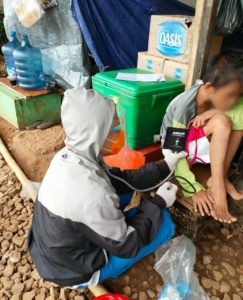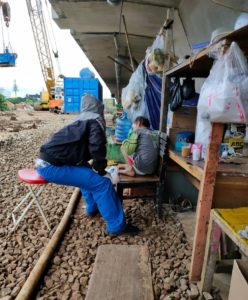 Under the scorching sun, nurse Dadan and I walk carefully through a busy road in South Jakarta. Today’s visit is promising to be quite challenging for me. Even though as the human resource manager at Rachel House, I have visited many patients with our clinical team, where we are going today is rather unusual.
Under the scorching sun, nurse Dadan and I walk carefully through a busy road in South Jakarta. Today’s visit is promising to be quite challenging for me. Even though as the human resource manager at Rachel House, I have visited many patients with our clinical team, where we are going today is rather unusual.
Ari* and his family live under a highway flyover and close to the railway track. While we were there, I was startled several times by the booming-loud noise when the trains passed by.
“How can they sleep at night.” I remarked to Dadan.
As I continued to walk behind Dadan who was leading the way, I looked around in disbelief at the scene before me and wonder where could this poor boy live.
When we finally arrived, I was shocked at the place where Ari and his family called “home”. A small shelter with tarp roof; this is not only the place where a family of 4 sleeps but is also a place where they earn their living.
“Assalamualaikum Nek.” Dadan greeted Ari’s grandma, who was sitting in a dilapidated rattan chair fanning herself with newspaper.
“Welcome! Please sit down.” Said grandmother.
Nurse Dadan introduced me briefly to grandma, before leaving us to check on Ari.
Alone with grandma, she started telling me how glad she is that Ari is now living with her. Ari had been living in an orphanage since his mother died when he was 2. But a few months ago, the orphanage told her that they could no longer look after him as he was falling ill too frequently. With Ari’s father missing, grandma was the only family left for Ari.
“I am happy Ari can live with me, but our situation is also quite difficult. I am constantly worried that I won’t be able to look after him properly. ”
 Grandma lives with her husband and their youngest child who has a mental health disorder. I cannot imagine the worries that must plague grandma every day, especially now having to take care of a sickly boy with compromised immunity.
Grandma lives with her husband and their youngest child who has a mental health disorder. I cannot imagine the worries that must plague grandma every day, especially now having to take care of a sickly boy with compromised immunity.
“Sometimes we don’t have any food to eat. Fortunately, Ari is not a fussy kid. But sometimes I do worry. Look at him, such a tiny boy!” Exclaimed Grandma.
As I look over towards Dadan where he is conducting physical examination for Ari in the hot and dusty area outside the shelter, I noticed how desperately thin Ari is. At 13, he has the body of a 6-year-old. A boy of not many words, only a shy smile noticeable on his face.
“It’s also hard for them to have access to clean water, Mbak Pay.” Dadan told me.
Grandma explained that they only shower occasionally as they have no access to running water. They put a bucket out to collect rainwater when it rains, for their cleaning purposes or simply to wash themselves after defecating.
It is unimaginable for me, to think about the hardships that grandma and family have to face every day. It is not only difficult for them to put food on the table, even clean water is difficult for them to access.
As I walked home, my thoughts drifted away to what would happen to Ari and family if Jakarta were to experience a heavy rainfall. Where would they go for shelter when their “house” is only made from tarp? What will happen to Ari and grandma if the area is flooded? What will be the fate of this family, who will protect them?
For the majority of our patients from the marginalized community, Rachel House’s support is their only lifeline to help and assistance. The only life buoy they know. Rachel House provides not only medical care, but also essential items such as diapers, high nutritious milk, basic necessities of rice and cooking oil, and transportation assistance to and from hospitals when needed. The sembako (groceries) that Rachel House supplies help ensure that at least for the next few days, the children and their families do not have to worry about where food and sustenance will come from.
If you would like to help give sparks of joy and sustenance to the children we care for at Rachel House, please donate to support our work.